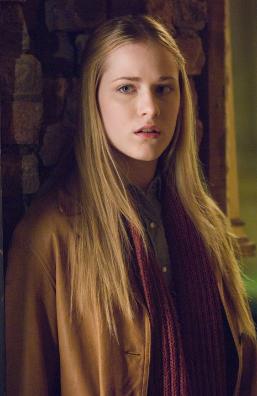
“All You Need Is Love” Across the Universe: Julie Taymor & The Beatles By Jen Johans (2008) |

| *Note: contains plot spoilers* Like most writers, I feel as though my works are never finished and often I wish I could go back and rewrite reviews after I’ve been able to appreciate the films on a richer level with additional viewings. With this in mind, it was with great hesitation that I dug back into the archives of my website, Film Intuition, to look at what I’d originally penned on October 15, 2007 in preparation for expanding my thoughts into a full-length paper on Julie Taymor's Across the Universe. And intriguingly, in fact, in the piece I did admit that, “Some of the choreography is remarkably inventive and warrants a second viewing just from the overwhelming finished product that marries both live action with animation along with perfectly synched movements.” While those words nearly anticipated that I’d regret what I’d written in the future, surprisingly, when it came to Across the Universe, I discovered that I had few regrets about the initial review I’d originally written. And perhaps even more startlingly, while at this point I’ve seen the film roughly half a dozen times (as not only a fan but as a film host who plans on screening the work near the end of August in my discussion series I created at Scottsdale Public Library), I realized there’s absolutely no way to duplicate the sheer enthusiasm I’d felt upon my first viewing. Therefore I decided I wouldn't even try, so to best capture my delight, I’ll begin my exploration of Julie Taymor’s breathtaking work by quoting directly from my introduction which illustrates not only my experience but also a brief overview of the piece:
Universe that featured Jim Sturgess seated on a white sandy British beach singing “Girl” before launching into an addictive and magical tapestry of Beatles music and dazzling visuals, the film has become the movie event I was most anticipating in 2007. More than most films, musicals must be seen on the big screen and Across the Universe is one of those movies that I know I’ll remember seeing for the first time for years to come. "A wholly satisfying work-- Frida director Taymor utilizes her roots staging operas and the Broadway version of The Lion King with this epic period film set in the turbulent 60’s that uses more than thirty Beatles songs for its inspirations in character, story and locales that span Liverpool, Princeton, several states, Vietnam and most prominently the lower east side of Manhattan.” (Film Intuition Review) Although American by birth, Taymor’s diverse life living and studying throughout the world is evidenced in every frame of Universe, given the brilliant tapestry of influences from different centuries and countries all melded together in each successive dazzling sequence. With as IMDb notes, a tremendous theatrical background with training in everything including mime work, mythology, folklore, Japanese puppetry, and fairy-tales, the two-time Tony award-winning Taymor discussed her good fortune of adapting Universe into the cinematic medium rather than being stuck with the limitations of theatre. She told ComingSoon.net that it wouldn't have had the epic scope or been made the same way it was, if the film had been confined to the stage. For proof, check out this clip below which opens the film as the Paul McCartney handsome yet John Lennon inspired Liverpool based dockworker Jude (The Other Boleyn Girl and 21’s Jim Sturgess) recalls the events of the film which will follow in a flashback. However, despite the previous clip which illustrates what can be done in post-production when one has the ability to play around in the editing room, Taymor did elect to take some of her theatrical techniques along with her by recording 90% of the songs live on set (IMDb) instead of having the actors lip-synch each one as is Hollywood tradition. And this firm belief in filming things live as though the actors were starring in a Broadway show meant that in a complicated duet such as “Strawberry Fields Forever” which finds one character in America and one in Vietnam, they’re shot simultaneously with footage being transposed on another so that it all unfolds as it happens in a Beatles homage (DVD). In fact, instead of a straight table reading, Taymor required months of musical rehearsals with the cast ahead of time and as the sound mixer noted on the DVD, regarding her tendency to show up with a new idea nearly every day, undaunted by the prospect of constant re- imagination and writing, Taymor is “probably the most creative director I’ve ever worked with.” Hoping for as she said an “explosion of color and emotion,” Taymor proved extremely unafraid of experimentation in terms of staging, cinematography and throughout every aspect of the process that makes the film a truly sensory experience where one is able to peel away more petals as if it’s a flower with each new viewing. While to the untrained film-going eye, little touches utilized throughout such as the one in “Strawberry Fields” may feel simply natural, deceptively simple or glossed over as we’re swept up in her mind-boggling artistry, to those with backgrounds in film and theatre, one can only remain in awe of the boldness, tenacity, and courage of this wholly original work. Completely, caught up in the artistry, I’d sung her praises early on in the hopes of an Oscar push, writing: “Additionally, if there’s any justice, it should also begin raking in the accolades and nominations for a much deserving Julie Taymor whose work recalls the same kind of Oscar for Special Recognition that Gene Kelly received for the epic ballet sequence in An American in Paris. While as a musical buff, it’s not lightly do I put another individual in the same category of cinematic genius as Kelly, keep in mind that he received the award for an approximately ten minute sequence whereas Taymor’s film runs a stunning two hours plus.” (Film Intuition Review Database) For an example of Kelly's impressive sequence, check out this brief excerpt so that you'll have it in mind as you read the rest of the paper: Although as Sharon Waxman of The New York Times reported, not everyone was as thrilled by Taymor’s experimentation and big budget art-film approach as in a shockingly unprecedented power play, before the film was scheduled to open, the Sony-based Revolution Studios producer Joe Roth seized control of the cutting room and made his own thirty minute shorter version of the film. Although, as Waxman continued, according to a source close to the director, this move left Taymor reeling and “considering taking her name off the movie,” ultimately, although she hasn’t commented on the situation, the final release is Taymor’s original vision. While critical reaction was mixed overall, the film did appear on some notable Top Ten Lists and earned one of its greatest champions in Roger Ebert who wrote that Universe “is the kind of movie you watch again, like listening to a favorite album.” And indeed, Beatles fans will find the veritable “Where’s Waldo?” like homage of Universe overwhelming as Beatles references can be found in every single frame of the film from lyrics spoken as dialogue, plot points, even down to the names of the primary characters. The cast includes: Jim Sturgess’s mop-topped Jude (“Hey Jude”), Joe Anderson’s mischievous Maxwell (“Maxwell’s Silver Hammer”), Thirteen star Evan Rachel Wood’s sweet, pretty Lucy (“Lucy in the Sky With Diamonds”) T.V. Carpio’s sexual orientation troubled “Prudence,” (“Dear Prudence”), Martin Luther McCoy’s Jimi Hendrix inspired Jo-Jo (“Get Back”) Dana Fuchs' Janis Joplin clone Sadie (“Sexy Sadie”). Despite this, first and foremost it’s an original story that’s far more compelling than the one created for the disastrous ABBA musical Mamma Mia! |



| Text Only (c) Jen Johans. filmintuition.com |










In the spirit of the 1960's and to prepare you for Taymor's Universe, I begin with an explosion of color, multimedia and emotion in a collage set-up which vanishes as you continue on into the film and article. |

Custom Search
| Note: When originally posted in 2008, the embedded videos we found online were all in working order. However, due to Sony Pictures copyright violation, a majority of the clips have now been removed from YouTube. We've chosen to leave all of the original videos throughout the piece to give you a reference point of where to follow along when you watch the film on your own to best appreciate the essay. |


